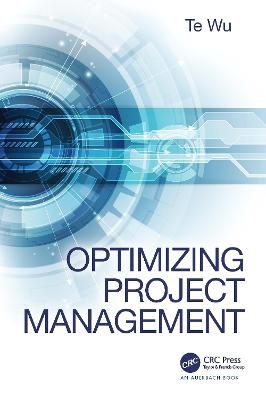
Optimizing Project Management
CRC Press (Verlag)
978-0-367-42992-8 (ISBN)
SHELVING GUIDE: Project Management
This hands-on guide is written for project professionals seeking to find an optimized way of performing project management. It provides answers to such critical questions as:
Why should an organization apply project management?
What is the value of project management in the broader context of an organization?
Is project management as successful as some advocates suggested or is it a waste of time and resources because of the many extensive and bureaucratic processes?
Which project management approach should our project team adopt: predictive or adaptive, waterfall or rolling water, extreme programming or Scrum?
This book aims to provide an optimized view of project management by balancing and blending competing methodologies (e.g., traditional versus Agile), lengthy methodologies and broad principles, processes and practices, and the need to understand versus the need to apply. It includes project management templates, an integrated case study illustrating how to apply tools and concepts, and a glossary of key terms.
Optimizing Project Management is for both aspiring and practicing project management professionals. It covers the core concepts, practices, and skills that are useful for developing new ideas, planning activities, implementing projects, and conducting planning and controlling of schedule, budget, and scope. The text is particularly useful for students, project professionals wanting to refresh their knowledge, and those pursuing project management certifications. This book is aligned with common project management standards such as the Project Management Body of Knowledge and the ISO 21502: Project, Programme and Portfolio Management — Guidance on Project Management.
Dr. Te Wu is the CEO of PMO Advisory, a consulting and a PMI Global Registered Education Provider. It is also one of the few companies offering portfolio (PfMP), program (PgMP), project (PMP/CAPM), risk (PMI-RMP), agile (PMI-ACP), organization leadership & change management, and PMO training. He is also a professor at Montclair State University and China Europe International Business School. Prof. Wu has more than 25 years of professional experience specializing in strategy execution and establishing and leading large PMOs, and he is certified in Portfolio, Program, Project, and Risk Management. He is an active volunteer including serving on PMI’s Portfolio Management and Risk Management Standard Core Teams. He is also a United States delegate on the International Standard Organization Technical Committee 258 for Project, Program and Portfolio Management. As a practitioner, executive, teacher, writer, and speaker, Dr. Wu enjoys sharing his knowledge and experiences and networking with other professionals.
List of Figures. List of Tables. List of Templates in Appendix A. Preface. Acknowledgments. Author. Part 1 SETTING THE STAGE. 1 Project Management – What and Why? 2 Organizing Project Management Knowledge – Principles, Knowledge Domains, Life Cycles, and Agile versus Traditional Approaches. Part 2 PROJECTS IN MOTION – FROM IDEAS TO RESULTS. 3 Ideation – Aligning Projects with Strategy. 4 Initiation – Starting the Project Right. 5 Preparation – Planning to Achieve Optimal Implementation. 6 Implementing Projects – Getting It Done. 7 Project Transition and/or Closure – Celebrating Success. Part 3 KNOWLEDGE DOMAIN. 8 Project Integration Management – The Most Important Knowledge Domain. 9 Stakeholder Management – Knowing the People. 10 Scope Management – Defining Scope and Determining Requirements. 11 Schedule Management – Understanding "When". 12 Resource Management – Defining the Resources Required to Tackle Projects. 13 Cost Management – How to Develop and Manage Budgets. 14 Communication Management – Ensuring the Full Handshake. 15 Risk Management – Minimizing Surprises. 16 Quality Management – Designing It Right. 17 Project Supply Chain Management – Extending beyond the Internal Resources. 18 Leveraging Conflicts – How to Find the Optimal Balance of Conflicts. 19 Governance Management – Establishing Decision Framework. Part 4 BEYOND PROJECT MANAGEMENT. 20 Working with People – Building, Mobilizing, Managing, and Leading Project Teams. 21 Program, Portfolio, Service Management, and Strategic Business Execution. Appendix A: Selective Project Management Templates. Appendix B: Case Study – Whole World Enterprise (WWE). Appendix C: Glossary of Key Terms. Index.
| Erscheinungsdatum | 15.05.2020 |
|---|---|
| Zusatzinfo | 29 Tables, black and white; 10 Illustrations, black and white |
| Verlagsort | London |
| Sprache | englisch |
| Maße | 156 x 234 mm |
| Gewicht | 526 g |
| Themenwelt | Mathematik / Informatik ► Informatik ► Theorie / Studium |
| Naturwissenschaften ► Biologie ► Ökologie / Naturschutz | |
| Technik ► Bauwesen | |
| Wirtschaft ► Betriebswirtschaft / Management ► Projektmanagement | |
| Wirtschaft ► Betriebswirtschaft / Management ► Unternehmensführung / Management | |
| ISBN-10 | 0-367-42992-6 / 0367429926 |
| ISBN-13 | 978-0-367-42992-8 / 9780367429928 |
| Zustand | Neuware |
| Haben Sie eine Frage zum Produkt? |
aus dem Bereich


